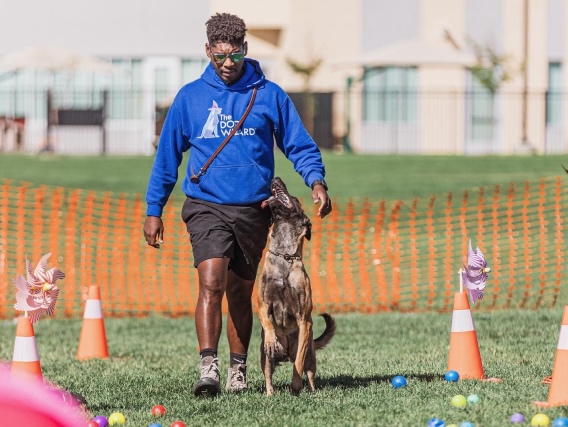Dog Training Charlotte NC: Your Course to a Well-Behaved Dog
Dog Training Charlotte NC: Your Course to a Well-Behaved Dog
Blog Article
Unlock Your Pet dog's Possible: Proven Canine Training Methods for Success
Efficient pet dog training is a nuanced process that pivots on understanding canine habits and employing scientifically backed approaches. By integrating favorable support, developing clear commands, and prioritizing socializing, pet dog proprietors can cultivate a productive partnership with their family pets.
Comprehending Canine Habits
Recognizing canine habits is necessary for reliable training and promoting a positive partnership between canines and their proprietors. A comprehensive grasp of canine body movement, articulations, and social interactions is crucial for recognizing their needs and feelings. Pet dogs interact mainly via non-verbal hints; for instance, a wagging tail may show enjoyment, while pinned ears can signal concern or submission.

Moreover, ecological aspects play a significant duty in forming a pet dog's habits. Adjustments in routine, new surroundings, or the visibility of strange people can cause stress or anxiousness in pets. Acknowledging these triggers enables proprietors to alleviate negative reactions and develop proper training techniques.
Inevitably, a deep understanding of pet behavior lays the structure for effective training approaches, enhancing both actions and the general bond in between the canine and its owner. Dog training. This understanding is indispensable for cultivating a well-adjusted, happy canine buddy
Positive Support Strategies
Efficient training relies greatly on positive reinforcement techniques, which have actually been shown to generate substantial results in shaping preferred behaviors in pets. This technique involves compensating a pet dog for showing particular habits, thus increasing the possibility that these habits will be repeated. Incentives can take different forms, consisting of treats, appreciation, toys, or playtime, depending on what encourages the individual canine.

It is necessary to progressively phase out benefits as the pet finds out the habits, transitioning to periodic support. This method keeps the behavior over time while avoiding reliance on consistent benefits. By concentrating on favorable reinforcement, trainers can cultivate a relying on relationship with their dogs, advertising a participating and healthy training atmosphere that enhances overall obedience and efficiency.
Developing Constant Commands
An essential element of successful pet dog training is the facility of regular commands. Uniformity in commands is essential for reliable communication between the pet dog and the trainer. When commands are consistent, dogs discover to associate details words with desired behaviors, which increases the training procedure and improves understanding.
To establish consistent commands, it is vital that all relative use the same terms and gestures. As an example, if a single person makes use of "sit" while an additional claims "sit down," it can create confusion for the dog. Select clear, distinct words for commands and ensure everyone involved in the canine's training complies with these choices.
In addition, repeating is vital. Enhance commands through frequent technique, guaranteeing that the pet gets ample possibilities to respond correctly. When a pet dog efficiently follows a command, instant favorable reinforcement must adhere to. This could be in the type of treats, praise, or playtime, strengthening the link between the command and the action.
Finally, be patient. Establishing constant commands takes some time and initiative. With commitment and quality, you will certainly help your dog establish a solid understanding of assumptions, eventually leading to a well-behaved friend.
Socializing and Direct Exposure
Interacting socially Get More Info a pet dog is necessary for fostering a positive and well-adjusted companion. This procedure includes subjecting your pet to a variety of settings, individuals, and other animals to establish their social skills and flexibility. Early socializing, ideally in between the ages of three to fourteen weeks, is important, as it lays the foundation for a pet's future behavior.
Throughout socialization, objective to provide favorable experiences in various setups, such as parks, hectic streets, and homes with other pets. Present your pet dog to different stimulations, consisting of noises, sights, and smells, making sure that each encounter is satisfying. This direct exposure assists alleviate fear and stress and additional hints anxiety, leading the way for a much more durable pet dog.
Involving in controlled team play sessions with other pets can additionally enhance social abilities, teaching your family pet suitable interactions and boundaries. Always monitor your pet's comfort degree during these experiences, slowly raising direct exposure as professional cat trainer near me their self-confidence grows. Remember, the objective is to develop an all-round animal that grows in diverse scenarios, advertising a harmonious relationship with both human beings and various other pets. Focusing on socializing will significantly add to your canine's total joy and actions throughout their life.
Overcoming Common Training Difficulties

Canines might battle to concentrate in busy or unfamiliar settings. Slowly desensitize your dog to distractions by starting training in a peaceful setting and gradually introducing more stimuli as they end up being skilled.
Furthermore, behavior concerns like leaping or extreme barking can come to be discouraging. Address these by showing alternative habits, such as sitting smoothly when welcoming visitors. Consistency and patience are important; reinforce wanted actions regularly and prevent scolding, which can bring about complication.
Lastly, identify that each pet is unique, and training timelines might differ. Tailor your method to your pet's private requirements, and seek expert advice if necessary. With willpower and the ideal methods, getting over these difficulties can lead to a well-trained, satisfied canine companion.
Conclusion
To conclude, opening a pet's possible necessitates an extensive method that incorporates an understanding of canine behavior, the application of favorable support methods, and the establishment of regular commands. Early socializing and direct exposure to diverse atmospheres even more enhance a canine's adaptability and confidence. By addressing typical training difficulties with customized methods and patience, a cooperative and unified partnership between pet dog and trainer can be cultivated, ultimately resulting in a well-behaved friend with the ability of prospering in different scenarios.
Reliable canine training is a nuanced process that hinges on recognizing canine behavior and employing medically backed approaches.Recognizing canine actions is vital for reliable training and fostering a favorable relationship in between pet dogs and their proprietors.Reliable training counts greatly on positive reinforcement strategies, which have been shown to yield significant results in shaping wanted behaviors in canines. When commands are consistent, pet dogs find out to connect details words with desired habits, which speeds up the training procedure and enhances understanding.
In final thought, unlocking a dog's potential necessitates a thorough approach that includes an understanding of canine habits, the application of favorable support strategies, and the establishment of regular commands.
Report this page